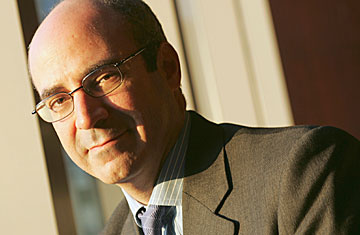
William Browder, chief executive of London-based Hermitage Capital Management, spends most of his energy these days shaming the Russian government
In October, Harvard Business School began teaching a new case study about Russia, which, in the words of one of its authors, "reads like a potboiler." In 20 pages, it lays out one of the most tragic experiences a foreign investor in Russia has ever had — the case of the American fund manager William Browder, who was banned from entering the country in 2005, and his lawyer, Sergei Magnitsky, who died in a Russian prison four years later. It is meant to impress a number of lessons on Harvard's latest crop of geniuses. For example, Exhibit 9, as the text goes, offers a "price list" of "bribes," including the cost of getting a competitor's license revoked (allegedly as little as $1 million). But the broader message lines up nicely with what seems to be Browder's creed: Kids, if you know what's good for you, stay the hell away from Russia.
Since news of his lawyer's death broke in 2009, Browder has devoted much of his time to hammering this message home, and his campaign (he prefers not to call it a "vendetta") has slowly grown into a one-man information war against the Russian state. So far he seems to be winning. A few months ago, I got a worried e-mail from a media official in the Russian government who was concerned about the awful coverage Russia was getting in the Western press. "Seems like Republicans aim to jeopardize U.S. Administration's Russian policy," he wrote. "What do you think of the timing of such a massive campaign?" A few days later, he wrote again. It wasn't the Republicans. It was just Browder. "I've calmed my colleagues down."
But compared with the GOP, Browder would seem to be the bigger threat. When I reached him earlier this month, he was in Germany to address the Bundestag and was heading to Lithuania the following day to speak to its Foreign Minister and parliament. He still runs an investment fund out of London, which helps keep up his estimated fortune of over $100 million, but most of his energy these days is spent shaming the Russian government. "This is an extremely important part of my life," he told me. "There are some weeks I spend nearly all my time on it."
He gets help from a Rolodex of politicians and businessmen, and when he takes the stage, Browder can be a powerful speaker, coating the poignancy of his story with self-deprecating humor. (Asked at a recent lecture what skills one might need to succeed as an investor in Russia, he answered, deadpan, "knife-handling skills.") Over the past two years, he has told his tale to legislatures in the U.K, U.S., Canada and 10 European countries. Several of those chambers, including the U.S. Congress, have since voted to impose travel bans on Russian officials, frozen Russian-held bank accounts or denounced Russia in the press. No single activist has had this broad an impact on Russia's relations with the West since the fall of the Soviet Union, which seems ironic if you consider Browder's ancestry. Born to a middle-class family in the South Side of Chicago — "with an old Buick and two dogs" — he is the grandson of Earl Browder, who led the Communist Party USA for 11 years. In 1945, when the U.S. party took the Kremlin's side at the beginning of the Cold War, the elder Browder was ousted for arguing that Moscow and Washington could peacefully coexist.
His grandson now preaches the opposite, and Harvard is his latest conquest. It may also prove to be the most significant. The new case study, based almost entirely on facts that Browder provided to the authors, will be taught at business schools around the world for many years to come. It recounts how Browder, once the biggest foreign investor in Russia's stock market, with a fund worth around $4 billion, was deemed persona non grata in 2005 after he fell afoul, according to the case study, of then President Vladimir Putin. It recounts the subsequent criminal probes and police raids at his offices, where several policemen allegedly "pulled [a lawyer] into a conference room and beat him brutally about the face and throat." Worst of all is the conclusion. Magnitsky, another one of Browder's lawyers, died in pretrial detention after he was denied medical treatment for months. He was 37, and left behind a wife and two children.
